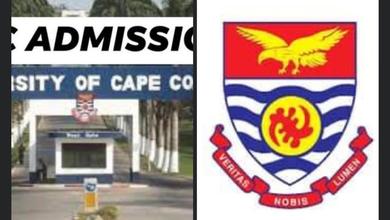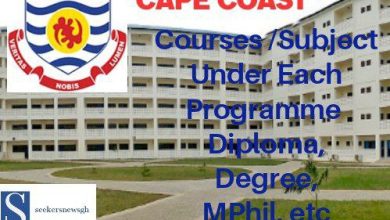University of Cape Coast Course UCC Outlines
-

UCC Admission list | Status Checker Portal 2024/25
UCC Admission Portal For those applying for admission, the University of Cape Coast provides UCC Admission Portal for tracking your…
Read More » -

Explore Courses Under UCC Master of Philosophy Science Education 2024
Explore Courses Under UCC Master of Philosophy Science Education Degree Type: Master of Philosophy Department: Department of Science Education Programme…
Read More » -

Courses Under B.Ed Arts University of Cape Coast UCC 2024
We’ve realized Students stay away from certain courses because they seem not to know the details, seekersnewsgh has dedicated this…
Read More » -

Courses Under Statistics University of Cape Coast UCC 2024
We’ve realized Students stay away from certain courses because they seem not to know the details, seekersnewsgh has dedicated this…
Read More » -

Courses Under BSc PSYCHOLOGY University of Cape Coast UCC 2024
We’ve realized Students stay away from certain courses because they seem not to know the details, seekersnewsgh has dedicated this…
Read More » -

UCC Admissions Support Hotlines Phone Numbers
UCC Admissions Support Hotlines Phone Numbers This blog seeks to direct you to all hotlines available to support you at…
Read More » -

2024 Request for Your UCC Transcript, Attestation, and English Proficiency Letter
Request for Your UCC Transcript, Attestation, English Proficiency Letter JOIN US ON WHATSAPP TO MAKE THE REQUEST Contact our Agent…
Read More » -

Postgraduate Sandwich Admissions Open | All Fees | Requirement | University of Cape Coast 2024
Postgraduate Sandwich Admissions Open | All Fees | Requirement | University of Cape Coast April 2023 CHECK ALL COURSES AND…
Read More » -

UCC Sandwich undergraduate admissions open | Programmes | FEES | Entrance Exams for 20yrs and Above
UCC Sandwich undergraduate admissions open | Programmes | FEES | Entrance Exams for 20yrs and Above We’ve realized Students stay…
Read More » -

Courses Under M.Phil Special Education University of Cape Coast – UCC 2024
We’ve realized Students stay away from certain courses because they seem not to know the details, seekersnewsgh has dedicated this…
Read More » -

2024 Courses Under EARLY CHILDHOOD EDUCATION University of Cape Coast [ Regular/Sandwich]
We’ve realized Students stay away from certain courses because they seem not to know the details, seekersnewsgh has dedicated this…
Read More » -

Courses Under COMMUNITY MENTAL HEALTH NURSING University of Cape Coast UCC 2024
We’ve realized Students stay away from certain courses because they seem not to know the details, seekersnewsgh has dedicated this…
Read More » -

Courses Under BSc Physics University of Cape Coast – UCC 2024
We’ve realized Students stay away from certain courses because they seem not to know the details, seekersnewsgh has dedicated this…
Read More » -

Courses Under BSc Mental Health University of Cape Coast UCC 2024
We’ve realized Students stay away from certain courses because they seem not to know the details, seekersnewsgh has dedicated this…
Read More » -

2024 UCC 5 Semester Bachelor of Education Sandwich Admission Portal open
CHECK ALL COURSES AND THEIR OUTLINE HOME More information can be obtained from the University YOU CAN JOIN OUR TELEGRAM …
Read More »





